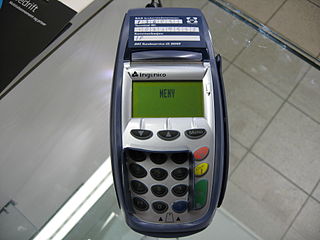Related Research Articles

The point of sale (POS) or point of purchase (POP) is the time and place at which a retail transaction is completed. At the point of sale, the merchant calculates the amount owed by the customer, indicates that amount, may prepare an invoice for the customer, and indicates the options for the customer to make payment. It is also the point at which a customer makes a payment to the merchant in exchange for goods or after provision of a service. After receiving payment, the merchant may issue a receipt for the transaction, which is usually printed but can also be dispensed with or sent electronically.
Installation of a computer program, is the act of making the program ready for execution. Installation refers to the particular configuration of a software or hardware with a view to making it usable with the computer. A soft or digital copy of the piece of software (program) is needed to install it. There are different processes of installing a piece of software (program). Because the process varies for each program and each computer, programs often come with an installer, a specialised program responsible for doing whatever is needed for the installation. Installation may be part of a larger software deployment process.
The Vundo Trojan is either a Trojan horse or a computer worm that is known to cause popups and advertising for rogue antispyware programs, and sporadically other misbehavior including performance degradation and denial of service with some websites including Google and Facebook. It also is used to deliver other malware to its host computers. Later versions include rootkits and ransomware.
The Zlob Trojan, identified by some antiviruses as Trojan.Zlob, is a Trojan horse which masquerades as a required video codec in the form of ActiveX. It was first detected in late 2005, but only started gaining attention in mid-2006.
Alureon is a trojan and rootkit created to steal data by intercepting a system's network traffic and searching for banking usernames and passwords, credit card data, PayPal information, social security numbers, and other sensitive user data. Following a series of customer complaints, Microsoft determined that Alureon caused a wave of BSoDs on some 32-bit Microsoft Windows systems. The update, MS10-015, triggered these crashes by breaking assumptions made by the malware author(s).
Sality is the classification for a family of malicious software (malware), which infects files on Microsoft Windows systems. Sality was first discovered in 2003 and has advanced over the years to become a dynamic, enduring and full-featured form of malicious code. Systems infected with Sality may communicate over a peer-to-peer (P2P) network to form a botnet for the purpose of relaying spam, proxying of communications, exfiltrating sensitive data, compromising web servers and/or coordinating distributed computing tasks for the purpose of processing intensive tasks. Since 2010, certain variants of Sality have also incorporated the use of rootkit functions as part of an ongoing evolution of the malware family. Because of its continued development and capabilities, Sality is considered to be one of the most complex and formidable forms of malware to date.
Slenfbot is the classification for a family of malicious software (malware), which infects files on Microsoft Windows systems. Slenfbot was first discovered in 2007 and, since then, numerous variants have followed; each with slightly different characteristics and new additions to the worm's payload, such as the ability to provide the attacker with unauthorized access to the compromised host. Slenfbot primarily spreads by luring users to follow links to websites, which contain a malicious payload. Slenfbot propagates via instant messaging applications, removable drives and/or the local network via network shares. The code for Slenfbot appears to be closely managed, which may provide attribution to a single group and/or indicate that a large portion of the code is shared amongst multiple groups. The inclusion of other malware families and variants as well as its own continuous evolution, makes Slenfbot a highly effective downloader with a propensity to cause even more damage to compromised systems.
InstallCore was an installation and content distribution platform created by ironSource, including a software development kit (SDK) for Windows and Mac OS X. The program allowed those using it for distribution to include monetization by advertisements, charging for installation, etc. and took pains to make its installations invisible to the user and to anti-virus software.
Dexter is a computer virus or point of sale malware which infects computers running Microsoft Windows and was discovered by IT security firm Seculert, in December 2012. It infects PoS systems worldwide and steals sensitive information such as Credit Card and Debit Card information.

Trojan:Win32/FakeSysdef, originally dispersed as an application called "HDD Defragmenter" hence the name "FakeSysdef" or "Fake System Defragmenter", is a Trojan targeting the Microsoft Windows operating system that was first documented in late 2010.
Memory-scraping malware or RAM Scrapping malware is a malware that scans the memory of digital devices, notably point-of-sale (POS) systems, to collect sensitive personal information, such as credit card numbers and personal identification numbers (PIN) for the purpose of exploitation.
Backoff is a kind of malware that targets point of sale (POS) systems. It is used to steal credit card data from point of sale machines at retail stores. Cybercriminals use Backoff to gather data from credit cards. It is installed via remote desktop type applications where POS systems are configured. It belongs to the POS malware family as it is known to scrape the memory of POS devices.

Point-of-sale malware is usually a type of malicious software (malware) that is used by cybercriminals to target point of sale (POS) and payment terminals with the intent to obtain credit card and debit card information, a card's track 1 or track 2 data and even the CVV code, by various man-in-the-middle attacks, that is the interception of the processing at the retail checkout point of sale system. The simplest, or most evasive, approach is RAM-scraping, accessing the system's memory and exporting the copied information via a remote access trojan (RAT) as this minimizes any software or hardware tampering, potentially leaving no footprints. POS attacks may also include the use of various bits of hardware: dongles, trojan card readers, (wireless) data transmitters and receivers. Being at the gateway of transactions, POS malware enables hackers to process and steal thousands, even millions, of transaction payment data, depending upon the target, the number of devices affected, and how long the attack goes undetected. This is done before or outside of the card information being (usually) encrypted and sent to the payment processor for authorization.
BlackPOS, also known as Kaptoxa, is a point-of-sale malware program designed to be installed in a point of sale (POS) system to scrape data from debit and credit cards. BlackPOS was used in the Target Corporation data breach of 2013.
FastPOS is a variant of POS malware discovered by Trend Micro researchers. The new POS malware foregrounds on how speed the credit card data is stolen and sent back to the hackers.
PunkeyPOS is a new type of Point of Sale Malware which was recently discovered by PandaLabs. This new Point of Sale Malware infects the Point of Sale(POS) Systems with two types of malware applications - keylogger and RAM Scraper. PunkeyPOS gets installed into the computer automatically without the knowledge of the user, in a similar manner as other POS malware.
A new sophisticated point-of-sale or memory-scraping malware called "Multigrain" was discovered on April 17, 2016 by the FireEye Inc. security company. Multigrain malware comes under the family of NewposThings Malware. This malware is similar to the NewposThings, FrameworkPOS and BernhardPOS malware which were known previously as notorious malware.
CenterPOS is a point of sale (POS) malware discovered Cyber Security Experts. It was discovered in September 2015 along with other kinds of POS malware, such as NewPOSThings, BlackPOS, and Alina. There are two versions which have been released by the developer responsible: version 1.7 and version 2.0. CenterPOS 2.0 has similar functionality to CenterPOS version 1.7. The 2.0 variant of CenterPOS malware added some more effective features, such as the addition of a configuration file for storing information in its command and control server.
Malumpos is a point of sale malware that are designed to steal or scrape customer’s credit and debit card detail from point of sale system. These are designed in a way that it records point of sale’s data which is running in an Oracle MICROS payment system of the restaurant. The collected data has been used in 333,000 customer sites around the world. Malumpos Malware targets hotels and other US businesses and put the retail customers at risk. This POS RAM Scraper is written in the Delphi programming language. Malumpos monitors, processes, scrapes the stolen data of the infected POS system and the RAM. First it stores the stolen credit or debit card details of the customer from the infected point of sale system once it is swiped. Then it sends the data to the cybercriminal to empty the customer bank balance or the details are sold to the black market.
Kasidet POS Malware is a variant of Point of Sale (POS) Malware that performs DDoS attacks using Namecoin's Dot-Bit service to scrape payment card details. It is also known as Trojan.MWZLesson or Neutrino and was found in September 2015 by cyber security experts. It is a combination of BackDoor.Neutrino.50 and the POS malware.
References
- ↑ "Alina POS malware "sparks" off a new variant". Trustwave.
- ↑ "Researchers ID New Variant of Alina PoS Malware | SecurityWeek.Com". www.securityweek.com. 18 December 2014.
- ↑ Alina POS Malware
- ↑ "PoS RAM Scraper Malware: Past, Present, and Future" (PDF).
- ↑ "PoS RAM Scraper Malware Mechanism". Archived from the original on 2016-08-10. Retrieved 2016-06-22.
- 1 2 "Alina: Casting a Shadow on POS". Trustwave.